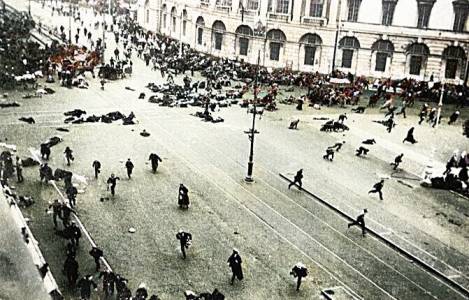
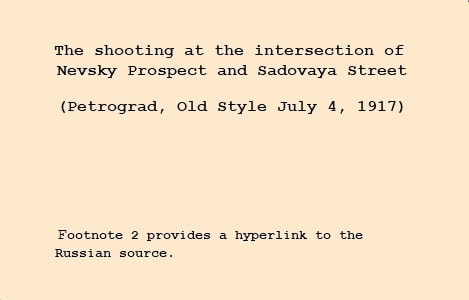
1. THE EIGHTEENTH OF JUNE.
One way or another June 18th will go down as a turning point in the history of the Russian revolution.
The mutual animus of the classes, their correlation, their strength (particularly of the political parties), all were revealed so distinctly, so strikingly, so impressively, by last Sunday's demonstration that the gain in political awareness and clarity has been tremendous, whatever the course and pace of future events might be.
In a few hours the demonstration scattered to the winds like a handful of dust the empty talk about Bolshevik conspirators and showed with utmost clarity that the vanguard of the working people of Russia, the industrial proletariat of the capital, and the overwhelming majority of the troops support the slogans that our Party has always advocated.
The measured step of the battalions of workers and soldiers. Nearly half a million demonstrators. A concerted onslaught. Unity around the slogans, predominating: "All power to the Soviets," "Down with the ten capitalist Ministers," "Neither a separate peace treaty with the Germans nor secret treaties with the Anglo-French capitalists," etc. No one who saw the demonstration has any doubt left about the victory of these slogans among the organized vanguard of Russia's workers and soldiers.
The demonstration of June 18th was a demonstration of the strength and policy of the revolutionary proletariat pointing the road to follow by the revolution, the way out of the impasse. This is the tremendous historical significance of last Sunday's demonstration and its essential difference with the demonstrations held for the funeral of the victims of the February revolution (Old Style March 23) or for May Day (Old Style April 18).
The demonstration in the day of the funeral was a universal tribute to the first victory of the revolution and its heroes. The people revisited the first leg of the path to freedom that was covered very fast and very successfully.
The May Day demonstration was a holiday of hopes and aspirations based on the history of the world labour movement and its ideal of peace and socialism.
Neither demonstration pointed a direction for the revolution nor could they do so. Neither demonstration put before the people, or raised in their name, specific definite and urgent questions about how and what direction the revolution should take.
In this sense June 18 was the first political demonstration of action, explaining how the various classes act, want to or will act, in order to move the revolution forward—an explanation not found in a book or newspaper but on the streets, not given by leaders but by the people.
The bourgeoisie kept out of the way. They refused to participate in that peaceful demonstration of a clear majority of the people, in which there was freedom of party slogans and whose chief aim was to anathematize the counter-revolution. That is natural. The bourgeoisie are the counter-revolution. They hide from the people. They organize real counter-revolutionary conspiracies against the people.
The parties now ruling Russia, the Socialist-Revolutionaries and Mensheviks, exposed themselves as waverers on that historic day, June 18. Their slogans bespoke wavering and it was obvious to everyone that their supporters were a minority. With their slogans they advised the people to stay put, to leave everything unchanged for the time being. And the people felt, and so did they, that such a prospect was untenable.
Enough of wavering, said the vanguard of the proletariat, the vanguard of Russia's workers and soldiers. Enough of wavering. The policy of trust in the capitalists, in their government, in their vain attempts at reform, in their war, in their policy of an offensive, is a hopeless policy. Its collapse is imminent. Its collapse is inevitable. And that collapse will also be the collapse of the ruling parties, the Socialist-Revolutionaries and the Mensheviks, for economic disruption is coming nearer and there is no escaping it except through the revolutionary measures of the revolutionary class that has taken power.
Let the people break with the policy of trust in the capitalists. Let them put their trust in the revolutionary class, the proletariat. The source of power lies in it and only in it. It alone pledges that the interests of the majority will be served, the interests of the working and exploited people who, though held down by war and capital, are capable of defeating war and capital!
A crisis of unprecedented scale has descended upon Russia and upon the whole of humanity. The only way out is to put one's trust in the most organized and advanced contingent of the working and exploited people, and to support that contingent's policy.
We do not know whether the people will grasp this lesson soon or how they will put it into effect. But we know for certain that apart from this lesson there is no way out of the impasse and that possible waverings or brutalities on the part of the counter-revolutionaries will lead nowhere.
There is no way out unless the masses put complete confidence in their leader, the proletariat.
2. SLANDER AND FACTS.
An immense torrent of abuse and slander is being poured on the Bolsheviks for the demonstration of July 3 and 4.1
They go so far as to accuse the Bolsheviks of "trying to seize the city," of wanting to "violate" the will of the Soviets, of "encroaching on the authority of the Soviets," and so on, and so forth.
The facts, however, show that the Bolsheviks did not seize a single building, a single institution, let alone a section of the city (although they could have) nor tried to do so even though the people were armed.
The facts show that the only political act of violence against an institution occurred on the night of July 4-5 when the military cadets and Cossacks wrecked Pravda on Polovtsev's orders, without the knowledge and against the will of the Soviet.
This is a fact.
It was a deliberate malicious use of force against an entire institution, an "encroachment" and "violation," not in words but in deeds. Had this encroachment been lawful the Provisional Government or the Soviet would have sanctioned it. Neither authority did so however. Those who committed violence against Pravda received no support either in the Soviet or in the Provisional Government.
The Bolsheviks appealed to the soldiers who had started the demonstration to act peaceably and in an organized way.
Neither the Provisional Government nor the Soviet appealed to the military cadets, the Cossacks or Polovtsev to act peaceably and in an organized lawful way.


But there was shooting, we are told.
Yes, there was. But who did the shooting? Who dares to blame it on anyone without an investigation?
Please listen to a witness from bourgeois quarters.
This witness is the paper Birzheviye Vedomosti, evening edition of July 4, a witness nobody in the world could suspect of partiality toward the Bolsheviks!
Here is what the witness says,
At 2 PM sharp, as the armed demonstrators were passing the Sadovaya and Nevsky intersection and a large number of spectators was watching quietly, a deafening shot rang out from the right side of Sadovaya, after which disorderly firing began.
And so, even the witness from the bourgeois paper is compelled to admit the truth, namely, that the shooting began from the right side of Sadovaya!! Surely this is a clear-enough indication that the shooting was aimed at the demonstrators.
Is it really so difficult to appreciate that if the demonstrators had planned or had wished to use force, they would have sent people against a definite institution, as Polovtsev sent military cadets and Cossacks against Pravda? Since sailors were killed, and since the witness from the bourgeois paper says that the shooting was started "from the right side of Sadovaya" "when the armed demonstrators were passing," isn't this obvious-enough proof that it was the Black Hundreds,3 the opponents of democracy, the quarters close to the Cadets, the ones who wanted and were bent on violence?
3. THE POLITICAL SITUATION
Don't let a single hour of legal work slip by. But don't cherish any constitutional or "peaceful" illusions. Form illegal organizations or cells everywhere and at once for the publication of leaflets, etc. Reorganize immediately, consistently, resolutely, all along the line.
Act as we did in 1912-14 when we could speak about overthrowing tsarism by revolution and armed uprising without losing our legal bench in the Duma, insurance societies, trade unions, etc.
4. TO THE CENTRAL COMMITTEE OF THE R.S.D.L.P.
It is possible that these lines will arrive too late, for events are developing with a swiftness that makes one's head spin sometimes. I am writing this on Wednesday August 30 and the recipients will read it no earlier than Friday September 2. Still, on the outside chance that my words stay relevant, I consider it my duty to write the following.
The Kornilov revolt is a most unexpected affair and a downright unbelievably sharp turn of events.1
Like every sharp turn it calls for a revision and change in tactics. And as with every revision we must be extra-cautious not to become unprincipled. It is my conviction that those who become unprincipled are people who (like Volodarsky) slide into defencism or (like other Bolsheviks) into a bloc with the Socialist-Revolutionaries, into supporting the Provisional Government. Their attitude is absolutely wrong and unprincipled. We shall become defencists only after the transfer of power to the proletariat, after a peace offer, after the secret treaties and the connections with the banks have been done away with—only afterwards. Neither the capture of Riga nor the capture of Petrograd will make us defencists (I should very much like to have Volodarsky read this). Until then we stand for a proletarian revolution, we are against the war, and we are not defencists.
Even now we must not support Kerensky's government. This is unprincipled. We may be asked: are we then not going to fight Kornilov? Of course we must! But this is not the same thing; there is a dividing line here which is being stepped over by some Bolsheviks who fall into compromise and allow themselves to be carried away by the run of events.
We shall fight, we are fighting Kornilov, just as Kerensky's troops are, but we do not support Kerensky. On the contrary we expose his weakness. There is the difference. It is a rather subtle difference but highly essential and must not be forgotten.
What then constitutes our change in tactics after the Kornilov revolt?
We are changing the form of our struggle against Kerensky. Without in the least relaxing our hostility towards him, without taking back a single word said against him, without renouncing the task of overthrowing him, we say that we must take the present situation into account. We shall not overthrow Kerensky right now. We shall handle the task of fighting him in a different way, namely, we shall point out Kerensky's weakness and vacillation to the people who are fighting Kornilov. That was done in the past, but now it is all-important, and this is our change in tactics.
Furthermore the all-important change entails the radicalization of our "partial demands" to Kerensky: arrest Milyukov, arm the Petrograd workers, summon the troops of Kronstadt, Vyborg and Helsingfors to Petrograd, dissolve the Duma, arrest Rodzyanko, legalize the transfer of the landed estates to the peasants, introduce workers' control over grain and factories, etc., etc.
We must publicize the demands we set before Kerensky among workers, soldiers and peasants carried away by the course of the struggle against Kornilov. We must keep up their enthusiasm, encourage them to deal with the generals and officers who have declared for Kornilov, urge them to demand the immediate transfer of land to the peasants, hint that it is necessary to arrest Rodzyanko and Milyukov, to dissolve the Duma, to close down and investigate Rech and the other bourgeois newspapers. The "Left" Socialist-Revolutionaries must be especially prodded in this direction.
It would be wrong to think that we have renounced the task of raising the proletariat to power. No. We came very close to doing so, not head-on but obliquely. Presently we must confront Kerensky, not as much directly as indirectly, by demanding a more vigorous, truly revolutionary war against Kornilov. The progress of that war can all by itself gift us power, but we must speak about it as little as possible in our propaganda. Always remember that tomorrow power may fall in our laps and then we shall not relinquish it. This vision should be conveyed by private letter to the propagandists, agitators and Party members in general.
We must fight relentlessly against phrases about the defence of the country, about a united front of revolutionary democrats, about supporting the Provisional Government, etc., etc., since they are just empty phrases. We must say: now is the time for action; you Socialist-Revolutionaries and Menshevik gentlemen have long since worn those phrases threadbare. Now is the time for action; the war against Kornilov must be conducted in a revolutionary fashion by drawing the masses into it, by rousing them, by inflaming them (Kerensky is afraid of the masses, afraid of the people). Action is required right now in the war against the Germans. An immediate and unconditional peace must be offered on precise terms. If this is done, a speedy peace can be attained or the war turned into a revolutionary one. If this is not done, all Mensheviks and Socialist-Revolutionaries will remain lackeys of imperialism.
By the summer of 1917 all the main trends of the Russian revolution stood out sharply; the process of democratization was bounded by certain rational limits, but it pressed forward, and as it did so, what had been a positive phenomenon began to turn negative. Workers set their own wages, hours of work and schedules; peasants seized private lands and other people's property; soldiers chose whether to go on the offensive or take a rest; railway workers and employees established "sparing" schedules for themselves and massively disrupted delivery of bread to the cities and ammunition or food to the front. Desertions reached horrific proportions, crime was off the charts. The country was crumbling to pieces. However no one dared to speak out against this suicidal course for fear his words would get branded as counter-revolutionary.
Objective historical laws rule supreme, and all unruly revolutions inevitably end in dictatorships. The English revolution of the 17th century ended with the establishment of the dictatorship of General Cromwell who took the title of Lord Protector. The Great French Revolution of the 18th century, notwithstanding all its democracy and radicalism, ended with the dictatorship of Napoleon who declared himself emperor.
Literate Russians were acquainted with these laws, so already in June-July they started discussing candidates for the "post" of dictator. And this was not the conspiratorial talk of a narrow circle of people, it was written about freely in the press, discussed in the newspapers, and certain names were bandied about: General Alekseyev, Vice-Admiral Kolchak, General Brusilov. These were the candidates of the statists, i.e., the law-and-order camp where not only the monarchists and the extreme Right dreamt of a dictatorship; so did yesterday's democrats, the Cadets and the Octobrists who had been sidelined socially and politically by the very democratic processes they had spawned in their day. The other end of the political spectrum also dreamt about a dictatorship (their own). Lenin knew very well how this transformation of democracy into anarchy would end, and the Bolsheviks under his leadership contributed to all these destructive processes specifically.
Russian democracy was doomed. The only question now was who would establish a dictatorship first, the Right or the Left.
The rightists were the first ones to sally forth, and they did so precisely under the pretext of forestalling a rise to power by the extreme Left. Perhaps the final push for decisive action was the fall of Riga on August 21. It became absolutely clear to Kornilov that day that the Army would be unable to defend the capital and the country.
No, it was not just a question of a military uprising, a coup d'etat. It was more complex, confusing. The fact is that Kerensky himself and almost all his ministers spoke about the need to establish order in the country "with a firm hand."
British ambassador Buchanan conveyed the words of Tereshchenko the Minister of Foreign Affairs to his government,
There is only one thing left: the introduction of martial law throughout the country, the use of military courts against the railway workers and forcing the peasants to sell grain... To my question as to whether Kerensky shared his views, Tereshchenko answered in the affirmative, but said that the prime minister's hands were tied.
And Kerensky's hands were tied indeed by the Soviets and by the Bolshevik soldiers of the Petrograd garrison. Consequently the need to untie his hands suggested itself.
Thus the goals of Kerensky and Kornilov concurred, differing only on the mechanism to establish a new tougher regime and on who would head such a regime.
Kerensky was not at all against using Kornilov as an instrument for establishing order, but the paradox was that he himself survived solely due to the confrontation between Right and Left. This was the essence and peculiarity of his power. Figuratively speaking, he stood with one foot on a Right footstool and another on a Left. The subtraction of either footstool would cause him to lose balance and fall. And it seems that Kerensky himself understood this. That is why he essayed an impossible task: to restore order in the country with the help of the Army, weakening the Left, but retaining power himself. The military argued more logically: if the Provisional Government is so weak that it cannot establish order by itself, why keep this feckless government in power?
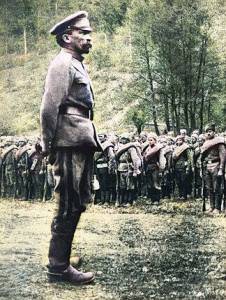
Points of view were exchanged in secret negotiations between Kerensky and Kornilov. Yes, yes, the Prime Minister himself worked in the preparation of the coup d'etat. True, Kornilov's envoys did not tell him everything that was being said at Headquarters where the supporters of the coup favoured a triumvirate, Kornilov-Kerensky-Savinkov, plus a major overhaul of the government. The socialist ministers had to be expelled from the government; but the logical question arose immediately: why should Kerensky the most important socialist stay put?! If power was shifting from democracy and demagogy to reliance on force, what role could the "Chief Persuader of the Russian Revolution" still play?! Clearly Kerensky was a mere figurehead and he himself began to understand this.
Finally, in one of the last messages from the Kornilovites to Kerensky, he was offered the portfolio of Minister of Justice. Wow, what impudence! Kerensky "allowed" them to stage a coup only to be made an insignificant minister? A complete career collapse this return to the same post he had in March, an obvious indication that he would not remain in the new government for long!
And then Kerensky breaks off negotiations with the Kornilovites. Now the Bolsheviks seem to be the lesser evil. They are weaker after the July days, the majority of the population views them as "German spies" and they do not have as many divisions as Kornilov.
Meanwhile the Commander-in-Chief assumed that he had secured the go-ahead from the top, so he started moving his troops to Petrograd. The 3rd Cavalry Corps under the command of General Krymov and the Wild Division set out. They received this order from Kornilov: "In the event of obtaining either from me or directly on the spot (information) about the start of a Bolshevik uprising, deploy immediately to Petrograd, occupy the city, disarm the Petrograd garrison members of the Bolshevik movement, disarm the population and dissolve the Soviets."
"A Bolshevik uprising is not expected at all," exclaimed Kerensky as he ordered the march halted, but General Krymov replied, "It is impossible to stop a matter that was begun with your approval." Then Kerensky declares Kornilov's move a "rebellion"; but the ministers do not support him. After all, the idea of suppressing the growing anarchy in the capital by military means was held widely. And Kornilov unawares sends a telegram to Kerensky informing him that Krymov's units will reach the city on the 28th and requesting him to declare martial law in Petrograd.
Kerensky's betrayal enrages Kornilov. He refuses to resign, and no general agrees to depose him. Kerensky then assumes command of the Army. In response Kornilov declares that he is taking full power into his own hands. Now this is a real rebellion.
Kerensky literally runs about in fear. He knows for certain that almost all officers in the capital's garrison are on the side of their beloved and respected general. Who will defend him? It is impossible to rely on any unit. There is only one thing left to do: appeal to the other "footstool," to the Bolsheviks. They will fight selflessly against Kornilov for he is coming with the main goal of destroying them. And tens of thousands of rifles are distributed to the Bolshevik Red Guard. They are distributed, it seems, only for the duration of the rebellion, but of course they will not be returned to the arsenals. They will be used in the October days precisely against the Provisional Government. And Kerensky asks for a detachment of sailors from the most Bolshevik ship in the Baltic Fleet—the cruiser Aurora—to serve as his personal guard.
Kornilov's rebellion failed. No, there were no bloody clashes. The citizens of democratic Russia, including the soldiers, Cossacks and highlanders, were simply not ready for civil war then. Having tasted freedom in the spring of 1917, spurning violence and accustomed to resolving all issues at rallies, they absolutely did not see any need to shoot "their own." They gladly attended rallies where Bolsheviks, anarchists and other opponents of the rebellion spoke. And after hearing all the speakers, the Cossacks resolved: "We will not shoot our own." General Krymov's units refused to obey orders and halted on the approaches to Petrograd. General Krymov shot himself.
Thus the establishment of a right-wing military dictatorship failed.
Presently the political pendulum swung to the side of the Left. The time had arrived to try and establish a dictatorship of the Left.
5. STORMY SUMMER.
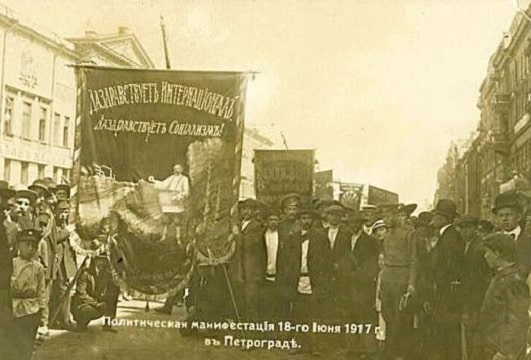
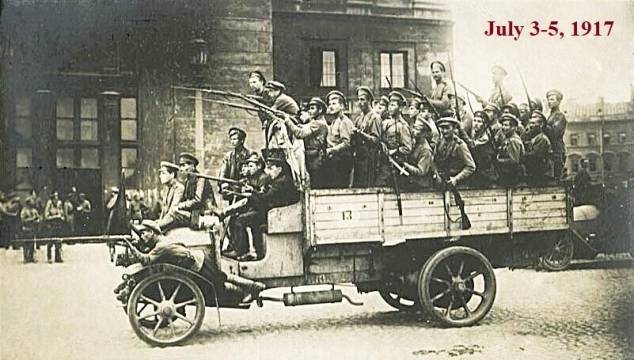
London: News of Russian victories in the war roused great enthusiasm in Petrograd.
Amsterdam: A Gazette de Cologne journalist says that the battles on the Eastern Front are the most violent to date.
Petrograd: The embassies of the Allies witnessed demonstrations of great enthusiasm over Russian successes in the war.
Petrograd: Peace activists put up posters calling for demonstrations. The Government declared martial law and a great number of demonstrators were arrested, among them two hundred and twenty agents provocateur.
Paris: News from Petrograd state that troops besieged a "band of armed criminals" holed up in a hotel. The besieged lobbed grenades at the troops and these assaulted the hotel, wrecking it. Sixty criminals were detained, one committed suicide.
Petrograd: Recent riots left six hundred and fifty persons wounded, forty of whom died. Someone shot at and missed Kerensky the Minister of War.
The Minister of Police resigned.
Khvostov the former Russian Minister of the Interior was arrested for having filched a million rubles.
London: The commandant general of the 12th Russian Army Corps was murdered; he had refused appointment to Governor of Petrograd.
The Russian Government resigns. All ministers handed their resignation to Kerensky.
Sturmer the former President of the Imperial Council died yesterday from a bout of uremia.
Petrograd: Municipal elections were held in an atmosphere of calm.
Petrograd: Apathy reigns following the Moscow Conference. The pacifist faction garnered the entire prestige of the Soviet. Six thousand soldiers and workers told the Army that only a complete victory will bring peace: "The restoration of discipline and of the Army hierarchy is extremely urgent to stifle revolt. Whoever dissents will be ruthlessly dealt with as a traitor."
Petrograd: The entire Ministry of War has resigned to give Kerensky full scope to act. The Government has ordered the arrest of eighty individuals, among them Lvov the ex-procurator of the Holy Synod who handled Kornilov's private communication to Kerensky. Kornilov refused to forfeit command of his troops and detained the Government envoy. The military governor of Petrograd resigned. The Executive Committee of the Soviet of workers, soldiers and peasants has circulated a manifesto stating that Kornilov comes to depose the Provisional Government and to usurp its functions; his deceived troops march on Petrograd thinking that their mission is to quell a counter-revolution. The manifesto concludes by saying that the duty of the Army is to protect the Provisional Government.
Kerensky Assassinated?. The Russian Embassy in London does not confirm the rumour that Kerensky has been murdered.
Petrograd: Colonel Verkhovsky the military commander of Moscow has been appointed Minister of War. Admiral Verderevsky has been appointed Minister of the Navy.
Paris: The Government sent a strongly worded telegram to the sailors of the Baltic Fleet demanding the immediate end to their acts of violence done under pretext of defending the revolution. Severe measures will be taken if calm is not restored.
Three companies of the Army went to the Army & Navy Club of Petrograd demanding the handover of General Sukhomlinov and his wife for a snap trial. Their request was denied.
Petrograd: General Sukhomlinov was sentenced to life imprisonment with forced labour.
| And Now For Something Completely Different |